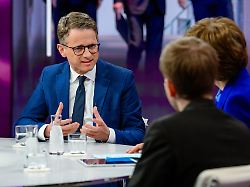The traffic light plan has collapsed – nothing will come of the budget for 2024 this year. The CDU general secretary sees a fundamental problem in the coalition confirmed: the SPD, Greens and FDP “have no common foundation”. He calls on the Chancellor to draw conclusions.
The news that was published on Thursday afternoon was not really surprising: The 2024 federal budget will not be discussed in the Bundestag until January. Federal Chancellor Olaf Scholz, Vice Chancellor Robert Habeck and Federal Finance Minister Christian Lindner do not yet know what the budget for the coming year will look like. With Maybrit Illner on ZDF on Thursday evening, SPD General Secretary Kevin Kühnert did not say what the problems were.
“We are striving to finish as quickly as possible,” said Kühnert, “but as of today it is clear: In terms of time frame, there are no longer any processes that will get us to a resolution on Budget 24 before Christmas. ” With the ruling of the Federal Constitutional Court a good three weeks ago, the basis of all politics in Germany, the public budget, was reduced by a large amount of billions. Filling this hole would be a major operation.
The state’s investment activity could be reduced. “And we are not prepared to do that,” said Kühnert. “This is about investments that are intended to preserve the core, the substance of the German economy, our industrial backbone; that something will be produced industrially here in the next 10, 20, 30 years.” This includes, for example, funding for the chip manufacturers Intel, TSMC and Infineon, which want to build plants in Dresden and Magdeburg. It’s about whether this state can be an investing state, said Kühnert.
“The country is completely unsettled”
Economist Jens Südekum also sees it that way. The reaction to the Karlsruhe ruling should not be to frantically scrape together money and save. Instead, the traffic light coalition should deal with the debt brake after the publication of the 2024 budget. “The tightened debt brake that we now have after the ruling is, in my opinion, a tightened corset,” said Südekum. It is currently not suitable to cope with the tasks facing this country. Germany is in a recession. According to Südekum, experts expect a recovery next year. This will not happen if investments are cut. Rather, the government must promote the economy.
CDU General Secretary Carsten Linnemann criticizes the work of the traffic lights. “The country is completely unsettled. I speak to citizens and companies every day. Many are frustrated because there is no plan, no goal, no future. And now we are entering the year 24 with little hope. ”
The CDU politician complains that the traffic light coalition has no common foundation. Looking at Scholz’s government statement last week, he says: “People are longing for leadership and orientation, and the Chancellor simply doesn’t show that.” Linnemann demands that the Chancellor must raise a vote of confidence in the Bundestag. If he won, the traffic light coalition would have to draw up a plan for the next two years. “They are welcome to make a new start, but things cannot continue like this.”
How the CDU wants to save money
It is now well known that the Christian Democrats are relying on austerity plans – especially in the social sector. Linnemann is now going one step further. It’s no longer just about cutting citizens’ money. People would have to be put to work – even through coercion. He also demands that Ukrainian refugees no longer be paid citizen’s allowance immediately after entering the country. Rather, they should get to work more quickly.
Sahra Wagenknecht, who wants to found her own party in January, sees it similarly. However, the former Left MP has a different plan for the budget gap. This should primarily be stopped by higher taxes for the rich. She also criticizes the special fund for the Bundeswehr. Although this must be defensive, this is also possible with lower funding, says Wagenknecht. The politician fundamentally calls for different policies in Germany.
Linnemann cannot really imagine that this would happen. The traffic light coalition simply has no timetable. Nevertheless, he is sure: “They will come to an agreement.” A coalition committee would be held next Sunday and a solution would be found by Monday, i.e. the start of the last week of the Bundestag session this year. But, says Linnemann: “The core problem remains. The Chancellor has to ask himself whether he can do it. I am no longer convinced.” Although Linnemann is not directly calling for new elections, he seems to think this step is the best.
Kühnert sees it differently. He wants the traffic lights to continue to rule. In addition, like Wagenknecht, he thinks it is a good idea to ask the rich people in this country to pay. Linnemann considers this to be impossible. In general, it looks like the two don’t agree on anything. Except for one: Neither of them want a new edition of the grand coalition.
